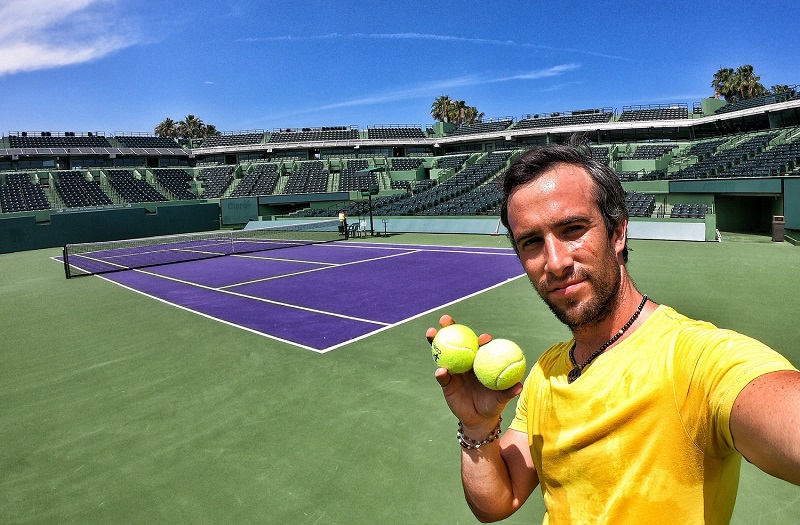Tennis
Tennis players cry on the courts and suffer from depression. Is the broken psyche of athletes a reflection of our times, argues elite strategist Schlesinger
World travel, sports in the sun and fabulous earnings. These are also benefits that women’s sports participation on the WTA tennis circuit undoubtedly brings. However, there is a downside to their sport, which brings enormous pressure and, for many, mental problems into the lives of tennis players.

World travel, sports in the sun and fabulous earnings. These are also benefits that women’s sports participation on the WTA tennis circuit undoubtedly brings. However, there is a downside to their sport, which brings enormous pressure and, for many, mental problems into the lives of tennis players. Anxiety, exhaustion, fear and depression. Increasingly, we are seeing similar confessions from top female athletes. How do we work with this? That’s what we asked professional athlete strategist Vit Schlesinger.
In 2018, the Japanese player Naomi Osaka, just 20 years old, broke into the top ten of the WTA world rankings. In the same year, she also celebrated her maiden Grand Slam title when she dominated the US Open. Since then, she has won three more times at the Big Four tournaments, becoming the world number one and, in 2020, the world’s highest-earning female athlete according to Forbes magazine.
But with that position, which Osaka has enjoyed for years, comes enormous pressure. When she withdrew from the ongoing French Open a year ago, it was revealed that she was struggling with depression for the third year at the time.
“The truth is that since the 2018 US Open, I’ve suffered from long bouts of depression and had huge problems coping. Everyone who knows me knows I’m an introvert, and you often see me wearing headphones at tournaments, which helps me manage my social anxiety,” Healthwise quoted her as saying.
It was the pressure from the public and the media, or the fear of speaking out, that exacerbated these uncomfortable conditions and grew to the point where Osaka had panic attacks and cried several times in front of TV cameras.
But she is far from the only one. According to the non-profit Athletes for Hope, more than a third of elite athletes suffer from mental health problems. Even star Serena Williams has admitted that she struggled with anxiety and bouts of fear at her peak. And there are many more cases.
Just recently, Grand Slam winner Simona Halep suffered a panic attack right on the court, and even young sensation Iga Swiatek couldn’t handle the pressure at the recent Tournament of Champions. A few days ago, the former tennis player Jelena Dokić declared that she was thinking of suicide.
Tennis as an individual sport is extremely demanding on the female psyche. “While men are hunters by nature and have always had fighting, competing and comparing ingrained in them, women, on the contrary, are better at cooperating with each other by their archetype. A woman needs tenderness. She needs to feel that she is accepted as she is. If she is to base her social worth on results and the approval of the public or even her loved ones, there is a problem. Such women often feel that they are failing, that they are not good enough,” says Vít Schlesinger, a holistic coach and strategist for top athletes, who for several years managed tennis player Tomáš Berdych, whom he accompanied at ATP tournaments.
“Tennis players earn fabulous money, but it has its toll. For eleven months they are packed in a suitcase and travel all over the world. So many of them have trouble finding a long-term, functional relationship. I’ve seen a lot of tennis players take their partners to top tournaments just to feel that tenderness and sense of recognition. Some tennis players without steady partners have tried to replace that feeling with something else,” Schlesinger said.
“Comparing ourselves and playing sports to win has long been imprinted in our DNA, it’s a game. But the game of elite sport for us has degenerated into a huge business, a power game where quick profit, quick fame and recognition is more important than honest play or the long term journey and that is then passed on to the individual athletes. They feel they can’t quite be themselves,” points out Vít Schlesinger. His clients include footballers Ladislav Krejčí Jr. of Sparta and Matěj Kovář of Manchester United, rally driver Erik Cais, Formula 3 driver Roman Staněk and OKTAGON MMA fighter Matěj Kuzník.
The problem, according to him, is not so much the pressure to perform and get results, but the fact that athletes are not prepared for it, that everything happens too fast. “An athlete grows up quickly, like it happened in the case of Osaka, his world changes quickly and he reaches a situation where he is no longer himself, he loses his identity and becomes a kind of product of sports business. The big moving colossus does not give the athlete the opportunity to rest, to breathe, and so he is, as Tomas once aptly put it, in a so-called washing machine. It is running at full speed and you are just spinning around in it,” he describes.
The more an athlete rises, the more his market value, his fame and influence grows. The more Schlesinger says he needs to know who he really is and what he wants not only from sport but also from life.
“They say that what doesn’t grow dies. It is important for an athlete to realize his identity and to look at his career as a journey, on which there must inevitably be partial defeats or a cooling of form. If I am not constantly growing, striving to improve myself, I cannot even have the joy that is the essence of all our activities. If I don’t get results, my journey as a top athlete won’t make sense to me, so I can quit or start doing something about it at any time,” he adds, giving guidance on how he believes every top athlete should proceed.
“Athletes are figuring out that it’s not just about performance, it’s about living a fulfilled life, discovering themselves, their limits, their fears and overcoming challenges in different forms. That’s why I try to get to a state of happiness first and foremost with my clients. Peak sport is full of pressure and once you are number one, you are under enormous pressure. But only the athlete decides whether he or she will let that pressure into his or her head. I feel similarly about the subject of mistakes or failure. If an athlete views them as part of the journey, it’s fine, if he sees it as the end of the journey, it’s a problem,” Schlesinger concludes.
Source:: vit-schlesinger.cz, sport.cz






